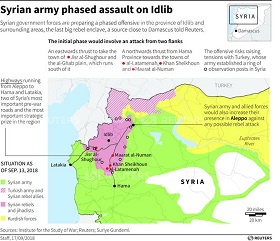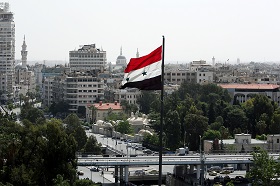Syria continues to be the key newsmaker when it comes to the international agenda. With the breakthrough agreement between Russia and Turkey and the recent downing of the Russian plane, the situation offers more questions than answers and remains the matter of the biggest concern. RIAC Website Editor Maria Smekalova asks Joost Hiltermann, International Crisis Group’s Program Director for MENA, the difficult questions on risks related to the situation in Syria.
Syria continues to be the key newsmaker when it comes to the international agenda. With the breakthrough agreement between Russia and Turkey and the recent downing of the Russian plane, the situation offers more questions than answers and remains the matter of the biggest concern. RIAC Website Editor Maria Smekalova asks Joost Hiltermann, International Crisis Group’s Program Director for MENA, the difficult questions on risks related to the situation in Syria.
How would you evaluate Russia – Turkey agreement on Idlib?
First of all, I think it’s really important that a deal was reached between Mr. Putin and Mr. Erdogan. If that hadn’t happened, I think, the offensive would have proceeded taking a huge humanitarian toll. Whatever the reason for the offensive, the majority of the people who would have been caught up are ordinary citizens and civilians. So, the fact that an agreement was possible in the first place is important for that reason. Secondly, it’s important because it shows that there’s still a possibility for a political transition in Syria, that it will require Russia and Turkey to work together. Thirdly, it was important because it gave some time to work out the very difficult issues that are playing in Idlib. An offensive can solve these problems by military means but at a huge cost. Now that we have more time, maybe these issues can be resolved differently. There’s a problem with jihadists in Idlib but maybe through joint efforts Russia and Turkey can resolve it in such a way that a humanitarian disaster is not caused (for example, by a lot of people fleeing towards the Turkish border, which, of course, Turkey doesn’t want). What is also good in this agreement is that it will create a demilitarized zone that will be of a certain size and it would prevent the skirmishes we’ve seen in the past that make an offensive more likely. What is more, the highway from Damascus to Aleppo runs through that area so the regular traffic will be restored. These are all positive things, but in the end we still haven’t resolved the real conflict in Idlib. At least now we have more time to work on that.
You’ve mentioned a lot of the positives, but what are the risks of this deal taken that Idlib is now controlled by Tahrir al-Sham?
They are the strongest group, there’s no question about that. There are also other rebels who are against Syrian regime but who are not jihadists. The downside is that the arrangement can fall apart, since it is seen as a short-term one and not as strategic partnership between Russia and Turkey aimed at addressing the political situation. If it’s only a short-term thing, then military action is going to happen sooner or later, and then we’re back to the scenario of a possible humanitarian disaster, with many people killed and many people fleeing outward. We just have to look at it positively right now. Two days ago I’ve might have said, “Listen, nothing good is going to happen,” but I don’t make predictions. I was worried that there wouldn't be a deal, but now there’s one, I have to be encouraging.
Taking into consideration the sad news about the downing of a Russian plane, what other risks does the situation entail?
These kinds of incidents are going to happen because in Syria we see that a number of forces from different countries and some non-state actors are all in close quarters, and it’s almost inevitable that people are going to make unintended mistakes. And what happened in this case, I think Russian Foreign Ministry or Defence Ministry has indicated, now what happened is that there was an attack by Israeli aircraft in the Latakia area while the Russian plane was landing nearby, Syrian air defence fired in the direction of the Israeli planes but hit the Russian plane and brought it down. That clearly wasn’t the intention of the Syrian air defence and it was an accident. However, accidents can take on political meaning and, of course, we already hear the Russian side that is blaming Israelis for having basically used the Russian plane as a shield in order to protect themselves from Syrian air defence. I don’t know whether it’s true or not, but the accusation is serious and may have consequences for the relations between Russia and Israel. And that’s the interest, because both sides have some powerful weapons. Accidents like this cause things to fall apart. You remember the situation with the Russian plane in Turkey – that certainly wasn’t a positive development for the Turks.







